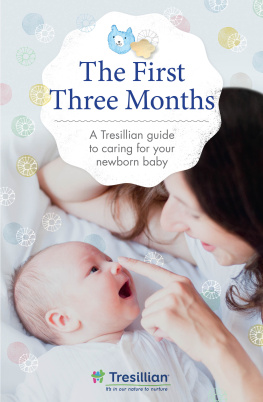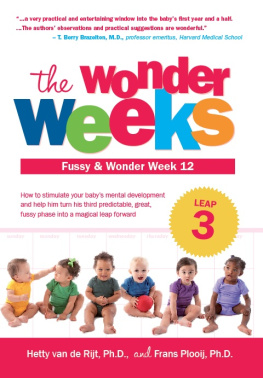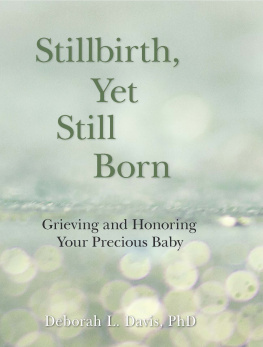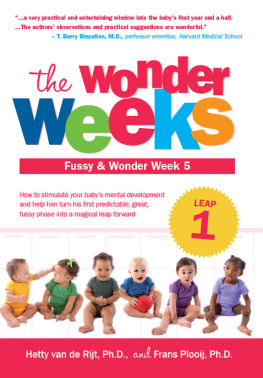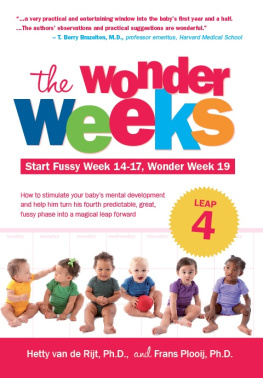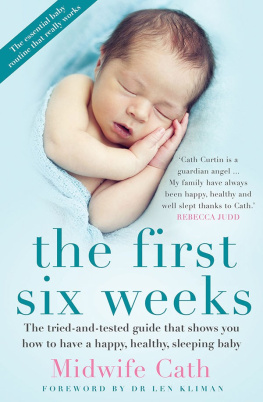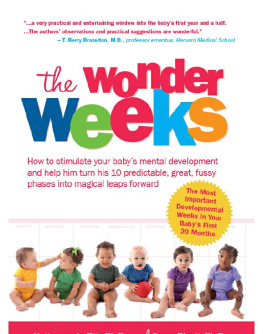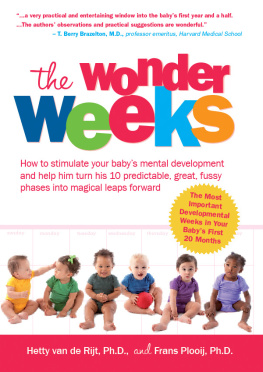Contents
Guide
Page List
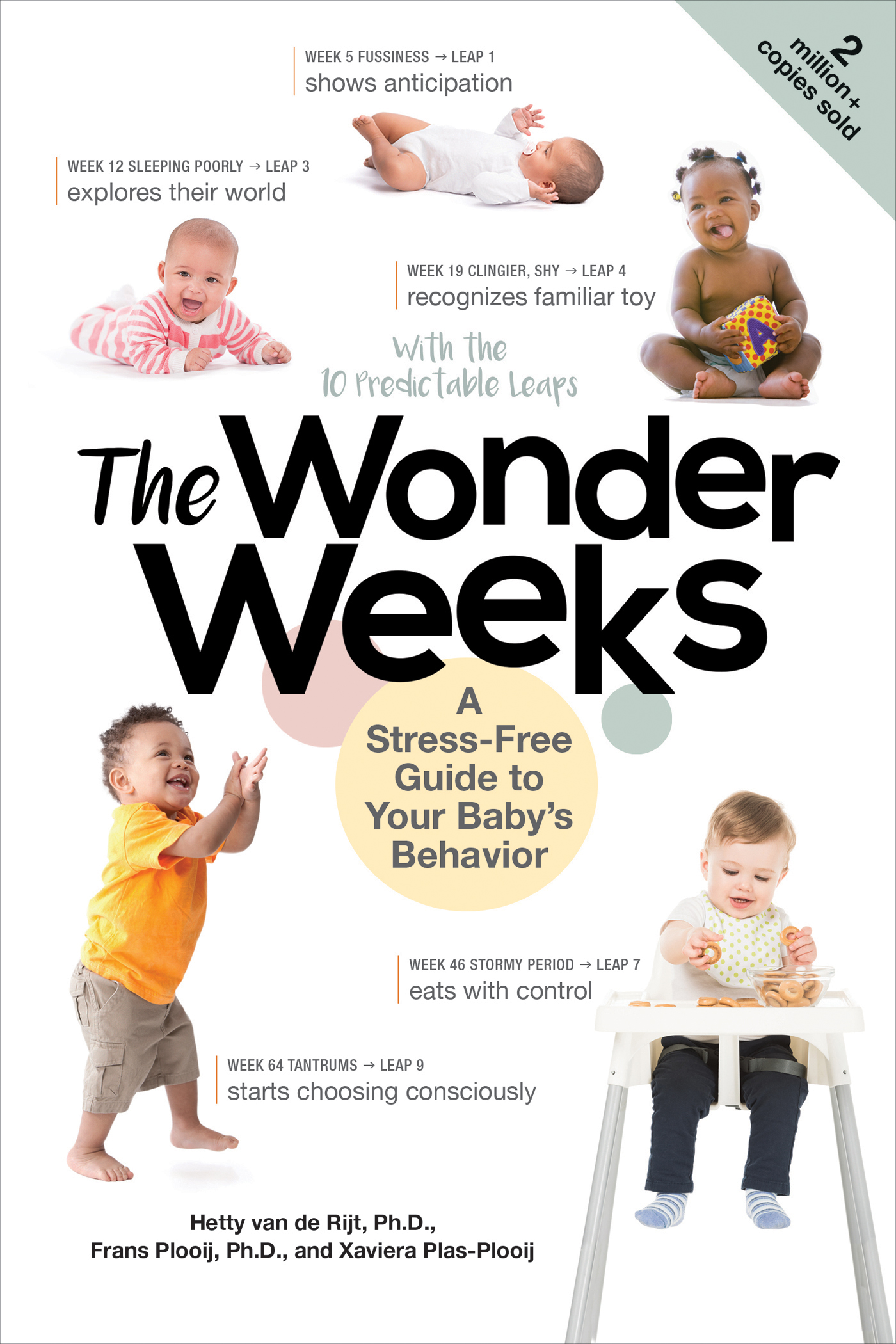
This is a very practical and entertaining window into the babies first year and a half. Van de Rijt and Plooij have observed and found the vulnerable times in an infants development. Wonderful.
T. Berry Brazelton, MD, Professor Emeritus, Harvard Medical School
Van de Rijt and Plooijs work on infant development has enormous value for clinical use and scientific application. Not only have they explained the periods of puzzling, difficult behavior in infancy which so worry parents, they have also shown how these behaviors mark developmental leaps and have described the stages in the infants understanding. Whats more, van de Rijt and Plooij have described the play and communication that work best with babies at different ages and thus helped parents understand and connect sensitively with their babies. This parent-child connection is the major prerequisite for the development of secure, well-adjusted children. The Wonder Weeks is essential reading for everyone who works with infantspediatricians, social workers, psychologists, and, of course, parents.
John Richer, MA (Oxon), PhD, Dipl Clin Psych. Honorary Consultant, Pediatric Psychology, Oxford University Hospitals NHS Foundation Trust, Oxford, England, and Department of Physiology, Anatomy and Genetics, University of Oxford
Anyone who deals with infants and young children will want to read The Wonder Weeks. The book will open parents eyes to aspects of their childrens growth, development, changing behavior, and emotional responsiveness that they might otherwise not notice or find puzzling and distressing.
Catherine Snow, PhD, Shattuck Professor of Education, Harvard Graduate School of Education
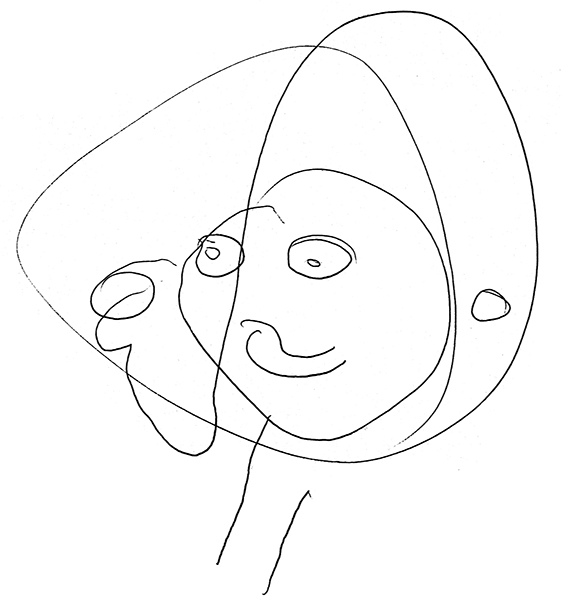
Portrait of Hetty van de Rijt, created by her grandson Thomas on September 12, 1998, when he was two years old. She and Thomas had a very close relationship, and during her last seven years, he was the sunshine in Hettys life, which was restricted by disease.
Hetty paid a high price for the research she undertook with her husband and coauthor, Frans Plooij. She contracted a tropical disease during their stay in Tanzania, and following a long, brave battle with the disease, passed away in 2003.
Through her lifes work, Hetty hoped to give parents across the world peace of mind and self-confidence to give all babies a chance of a smart start for a happy beginning. She lives on through The Wonder Weeks.
With the 10 Predictable Leaps
The Wonder Weeks
A Stress-Free Guide to Your Babys Behavior
Hetty van de Rijt, PhD, Frans X. Plooij, PhD, and Xaviera Plas-Plooij

Copyright 2019 Kiddy World Promotions BVThe Netherlands
First published in 1992 as Oei, ik groei! by Zomer & Keuning Boeken BV, Ede and Antwerp
All rights reserved
For information about permission to reproduce selections from this book, write to
Permissions, The Countryman Press, 500 Fifth Avenue, New York, NY 10110
For information about special discounts for bulk purchases, please contact
W. W. Norton Special Sales at specialsales@wwnorton.com or 800-233-4830
Book design by Anna Reich
Production manager: Devon Zahn
Library of Congress Cataloging-in-Publication Data is available
The Countryman Press
www.countrymanpress.com
A division of W. W. Norton & Company, Inc.
500 Fifth Avenue, New York, NY 10110
www.wwnorton.com
978-1-68268-427-6 (pbk.)
978-1-68268-387-3 (ebk.)
For our sweethearts, heroes, and examples:
Marco, Thomas, Victoria, and Sarah
Important Note
This book is intended as a general information resource about how babies behave at various points during the normal development process, and why they behave that way, so you can have a better idea of what to expect along the way. Neither the publisher, authors, nor anyone else involved in the development, production, marketing, or distribution of this book makes or can make any promises at all about how your particular baby or toddler will develop or behave, or about whether any suggestion or recommendation in this book will work for you and your particular baby or toddler.
This book is not a substitute for individual medical diagnosis or treatment of your particular baby or toddler. If you have any doubt or concern about the behavior, development, or physical wellbeing of your child, always consult your childs pediatrician or another appropriately trained medical professional. Do not hesitate to seek emergency care for your child or yourself if you think it may be needed.
Neither the publisher nor any author controls the content of any third-party website that may be mentioned in this book. You should always do your own research before adopting any new practices or using any new products.
Contents

Having a baby is at the top of the list of things youll never forget. Its likely youll always remember things like what you ate the night before it all started, the exact time of the delivery, who you called first to tell the news. Your baby arrived and you are suddenly a parent. And whether this is your first time or you have had a baby before, it is always special.
I feel that way toward The Wonder Weeksit was born to my parents, Hetty van de Rijt and Frans Plooij, but it has become mine, too, in the last decade or so. The three of us, in addition to the entire Wonder Weeks team, are proud that we have been able to help millions of parents globally. Every email, post, or message we receive from parents gives us a sense of joy. It is just like someone complimenting you on your baby! We receive such satisfaction from being able to help parents, so if you ever find yourself searching for answers, we are here to help you!
There have been many changes since The Wonder Weeks was first published in 1992. Snail mail has been replaced by social media and emails, parents have a different view of parenthood, and fathers are now just as involved with the upbringing as mothers are. When my mother and father started their original research, fathers went to work and mothers cared for the baby. There were always exceptions, of course, my father being one. For the two years my mother worked on her PhD at Cambridge University, he stayed at home with me. He would then go on to work a full day until 10 p.m. while my mother took over at home.
Fortunately, fathers and mothers play more equal roles these days. The way we deal with the postnatal period and breastfeeding has also changed drastically over the years. In the past, for instance, mothers often felt pressured about their choices, whether to breastfeed or use formula, how long to nurse, when to wean, and so forth. Nowadays, as a mother you can feed your child for as long as you choose, on demand (and not at set times!), and openly. Businesses are even required to offer new mothers pumping rooms for privacy. Hopefully you feel less like you need to follow arbitrary rules about leaving your baby to cry, or feeding them on a schedule, and other things that feel completely unnatural, and instead can follow your natural instincts more than ever before.


